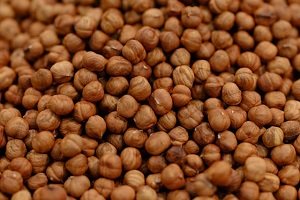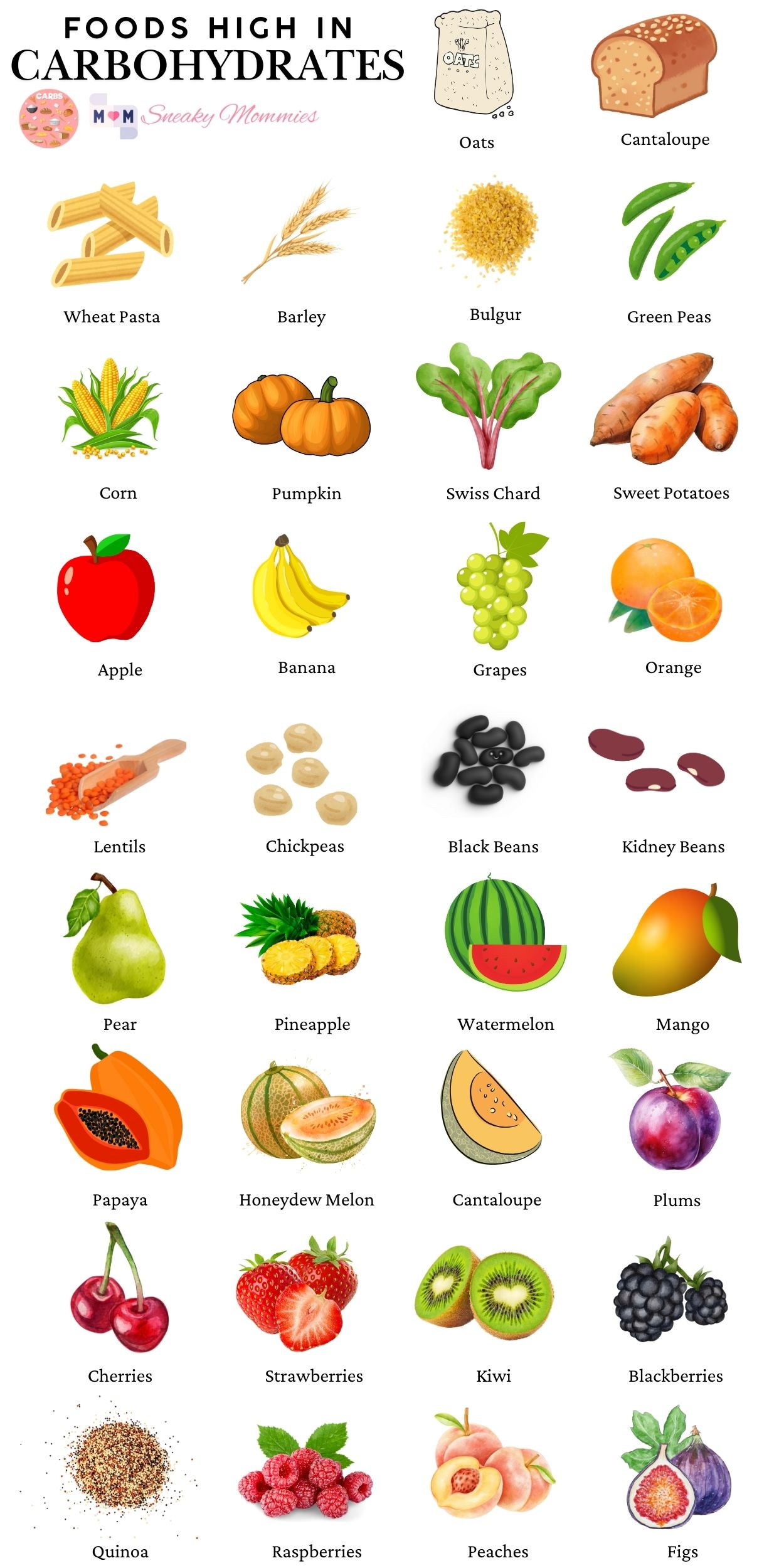In the world of nutrition, carbohydrates are often misunderstood. Carbs are the primary source of energy and one of the three main nutrients found in food. Whether you are into fitness and sports, have a long buddy job, or just want to shift towards a healthy eating habit, focusing on your carbs is crucial. Carbohydrates come in two main forms: simple and complex. Simple carbs provide quick energy, whereas complex carbs provide sustained energy.
Here’s a long list of all the carbohydrate-rich food items you can consume throughout the day. Have a look:
Complex Carbohydrates:
1. Oats (1 cup cooked) – 27g
Oats are a breakfast classic packed with slow-digesting complex carbs. This nutritional option provides a steady energy release that keeps you going for hours. Oats are rich in beta-glucan, a type of fiber that can support heart health and promote satiety.

2. Quinoa (1 cup cooked) – 39g
Quinoa is an ancient grain loaded with complex carbs. It is one of the very few plant-based, vegan options that contains a complete protein profile. The carbs in quinoa provide lasting energy, while its unique nutrient mix can help sustain muscle function and recovery.

3. Brown Rice (1 cup cooked) – 45g
With its bran and germ layers left undisturbed, brown rice offers complex carbs. They are unprocessed and have a higher fiber content than white rice, which helps stabilize blood sugar. Its nutty flavor and chewy texture are perfect in both sweet and savory dishes.

4. Sweet Potato (1 medium) – 26g
Sweet potatoes bring a natural sweetness alongside complex carbs, plus a good dose of fibre. Their earthy flavour makes them go well whether steamed, roasted or pan-fried. Sweet potatoes are rich in beta-carotene, which the body converts to vitamin A. Since these carbs digest slowly, they are perfect for sustained energy.

5. Whole Wheat Bread (1 slice) – 12g
Whole wheat bread is a classic source of complex carbs with fiber. The bran and germ that remain during milling help retain essential nutrients like B vitamins, iron, and magnesium. The carbs digest slowly, making whole wheat bread a good choice for an energy boost without the sugar crash.

6. Whole Wheat Pasta (1 cup cooked) – 37g
Whole wheat pasta provides more fiber and nutrients than regular pasta. Thanks to their high complex carb content, they support steady energy levels and help avoid hunger pangs for a long. They aren’t as high in calories as regular pasta, thus a good option for those on a weight loss journey.

7. Barley (1 cup cooked) – 44g
Barley is an ancient grain known for its chewy texture and complex carbs that break down slowly. It’s high in beta-glucan, a fiber that supports heart health and digestion. You can include barley in your soups, salads, and stew.

8. Bulgur (1 cup cooked) – 34g
Bulgur is a quick-cooking grain made from cracked wheat. It preserves all the benefits of whole grains, including complex carbs that sustain energy. Bulgur is also a good source of potassium, magnesium, iron, and Vitamin B6.

9. Black Beans (1 cup cooked) – 41g
Black beans are fiber-rich legumes with complex carbs, protein, and iron. Their carbs digest slowly, promoting a sense of fullness and offering a stable energy boost. They are also a good source of antioxidants that may help with gut health and weight loss.

10. Lentils (1 cup cooked) – 40g
Lentils are small but mighty, providing complex carbs, protein, and fiber in a single-cooked bowl. The slow-release carbs in lentils mean they keep you satisfied for longer, helping with energy throughout the day. The best part is that lentils are easy to cook.

11. Chickpeas (1 cup cooked) – 45g
Chickpeas contain a good amount of carbs, particularly complex carbs that make them ideal for energy and muscle support. Their fibre-rich profile helps with blood sugar control. Checkpeas also contain a good amount of potassium, magnesium, iron and Vitamin B6.

12. Kidney Beans (1 cup cooked) – 40g
Kidney beans offer a dense source of complex carbs that break down slowly, providing energy for a long time. Have them for your breakfast, and you will feel energized until lunch without needing anything in between. They are also high in protein and fiber, which supports fullness and digestive health.

13. Green Peas (1 cup) – 21g
The winter wonder green peas have fewer carbs than many legumes. The mighty greens peas are full of fiber and vitamins like A and K. Their complex carbs help maintain energy levels, while their subtle sweetness adds a nice flavor to dishes.

14. Corn (1 cup) – 27g
Corn, while technically a grain, is often enjoyed as a vegetable. It is a good source of complex carbs that slowly release energy. It is also rich in fibre, B vitamins, and antioxidants, which makes it a nutritious and versatile choice.

15. Pumpkin (1 cup cooked) – 12g
Pumpkin is lower in carbs than many other starchy vegetables. Its bright orange colour comes from beta-carotene, which the body uses for immune support. Pumpkins in the form of soup also help with weight loss and weight management.

Simple Carbohydrates:
16. Apple (1 medium) – 25g
Apples are rich in simple carbs, mainly fructose, and thus provide instant energy boost. Being high in fibre, apples help in the digestion of these sugars, making them a balanced snack for both quick and sustained energy. They are also a good source of Vitamin C and antioxidants.

17. Banana (1 medium) – 27g
Bananas are loaded with potassium, natural sugar and simple carbs. They provide instant and lasting energy and, therefore, are a popular choice amongst athletes, gym enthusiasts, and sportspersons. Bananas also support muscle recovery and hydration.

18. Grapes (1 cup) – 27g
Grapes are carbohydrate-rich, mainly from glucose. Consuming grapes releases glucose quickly in the form of an instant energy boost. These small fruits are ideal for anyone needing fast fuel, especially before a workout.

19. Orange (1 medium) – 15g
Oranges are filled with simple carbs and fiber. They are also known for their high Vitamin C content, which supports immune health. The combination of sweetness and fiber in oranges keeps blood sugar balanced while offering a sweet pick-me-up.

20. Pear (1 medium) – 27g
Pears pack in simple sugars and dietary fibre along with a good amount of cards. They are a balanced energy source that is gentle on the stomach. Known for their smooth, sweet flavor, pears also contain antioxidants and hydration.

21. Pineapple (1 cup) – 22g
Pineapples are loved for their tropical, tangy taste and energizing sweetness. These fruits are rich in carbs, mainly sugar and bromelain, an enzyme that aids digestion. Consuming pineapple regularly helps with energy and digestive support.

22. Watermelon (1 cup) – 11g
Watermelon is relatively low in carbs but full of hydrating sugars and water. Its refreshing, mild sweetness and high water content help increase energy levels without a heavy carb load. Watermelons are ideal for a mid-summer snack or for post-workout hydration.

23. Mango (1 medium) – 50g
Mangoes are a good source of carbs, mainly because of the high amount of natural sugars. They are noted as an excellent tropical energy booster. The carbs in mango fuel activity while providing fiber to moderate blood sugar release. Mangoes are also rich in vitamins A and C.

24. Papaya (1 cup) – 14g
Papayas aren’t loaded with carbs, but they offer moderate amounts of simple sugars. This yellow fruit is also rich in enzymes like papain, which supports digestion. If you are looking for a gentle, fiber-rich carb option, have 1 bowl of papaya every day.

25. Honeydew Melon (1 cup) – 16g
Honeydew melon provides light, sweet carbs that are easy on the stomach. These fruits are high in water content, which makes them a hydrating option on a warm sunny day. They are also a good source of Vitamin C, B6 and some amount of potassium.

26. Cantaloupe (1 cup) – 13g
Cantaloupe has a moderate amount of carbs but a very hydrating sweetness. They are rich in Vitamin C and contain a moderate amount of Vitamin B6, magnesium and iron. Its carbs are easy to digest and provide quick energy without being overly filling.

27. Plums (1 medium) – 8g
Plums offer a small but powerful dose of natural sugars, giving a quick energy boost. Plum has an average of 30 calories per medium size but a good amount of potassium, magnesium, phosphorus, and Vitamin A.

28. Cherries (1 cup) – 25g
Cherries are a flavorful source of simple carbs and antioxidants. A handful or two of fresh, ripped cherries provide fast-acting energy that can also aid in muscle recovery. Cherries also contain a high amount of Vitamin C.

29. Strawberries (1 cup) – 12g
Strawberries are low in carbs but full of fiber, giving them a natural sweetness that’s satisfying and energizing. They also contain antioxidants, primarily anthocyanin, that give it a red color and protect cells from damage.

30. Kiwi (1 medium) – 10g
Kiwis offer a compact energy boost with simple sugars balanced by fiber. Also known as Chinese gooseberry, Kiwi supports healthful skin, promotes better sleep, regulates heart health and blood pressure, and prevents kidney stones.

31. Blackberries (1 cup) – 14g
Blackberries are a rich source of potassium and antioxidants and have moderate carbs. These tiny fruits are packed with fiber and carbs that make them energising without causing spikes in blood sugar. Blackberries are also a good source of Vitamin C.

32. Raspberries (1 cup) – 15g
Raspberries provide a balanced dose of carbs and fiber, which helps stabilize blood sugar and release energy gradually. They aren’t as high in sugar as other fruits. Their low sugar content and high antioxidants make them perfect as a light, energy-boosting snack.

33. Peaches (1 medium) – 14g
Peaches are naturally sweet and hydrating. A medium-sized peach contains 14 to 15 grams of carbohydrates, offering a quick-release energy boost. With fiber and vitamin C, they are a refreshing choice for snacks and smoothies.

34. Blueberries (1 cup) – 21g
Blueberries are higher in carbs and provide a powerful energy source. A cup of fresh, juicy blueberries contains nearly 21/ 22 grams of carbohydrates, 25% of the DV of Vitamin C, 36% of the DV of Vitamin K, and several antioxidants.

35. Figs (100 grams) – 20g
Figs contain a moderate amount of carbs, nearly 20 grams per 100 grams. They are dense in simple sugars, giving an immediate energy lift. With fiber to stabilize blood sugar, they make a balanced, nutrient-dense choice for on-the-go snacking. Figs are also a rich source of potassium.

Frequently Asked Questions:
What is the healthiest carb to eat?
Whole grains like quinoa, oats, and brown rice are among the healthiest carbs. They are also a rich source of fibre content, vitamins, and minerals.
Which carb should I avoid to stay healthy?
To stay healthy and fit, avoid refined carbs like white bread, pastries, sugary drinks, and processed snacks. These carbs contain minimal fibre and nutrients, which cause quick blood sugar spikes and crashes.
How much carbs should I consume every day?
For an adult, 225-325 grams of carbs per day (in a 2,000-calorie diet) is enough to maintain energy levels.
What is the 5 to 1 rule for carbs?
The 5-to-1 rule is simple: for every 5 grams of total carbs, look for at least 1 gram of fibre.
What is the difference between simple and complex carbs?
Simple carbs consist of one or two sugar molecules lacking in many nutrients but provide a quick energy boost. Complex carbs are made up of longer chains of sugar molecules and offer slow but long-lasting energy.





Leave a Reply